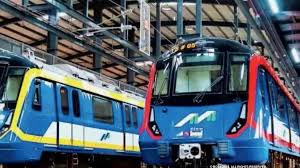Mumbai’s rapidly expanding metro network is on the cusp of achieving a critical milestone with the Metro Line 7A project—an underground link set to directly connect Mira Road with Chhatrapati Shivaji Maharaj International Airport (T2).
The Mumbai Metropolitan Region Development Authority (MMRDA) has confirmed that tunnelling work on the second of the twin tunnels is nearing its final stretch, with completion anticipated by the end of May. This 3.4-kilometre line, while compact in scale, plays an outsized role in the city’s vision for seamless, sustainable, and multimodal connectivity. Once operational, Metro 7A will create a critical transit spine between the airport and Mumbai’s northern suburbs by integrating with Metro Lines 7 and 9. This is expected to transform the daily commute for thousands of passengers, particularly those navigating the congested corridors between Mira Bhayandar, Andheri East, and the airport.
Technically ambitious, the project includes both underground and elevated sections—0.94 kilometres of elevated viaduct, 2.5 kilometres of underground tunnelling, and a transition ramp. The recently completed downline tunnel was driven by the tunnel boring machine ‘Disha’, which has already carved out over 1.6 kilometres of the underground path. Only 100 metres of tunnelling remain on the upline, with MMRDA officials confident of meeting the May-end target.
The station infrastructure includes an elevated stop at Airport Colony and an underground terminal directly at T2, ensuring hassle-free airport access that rivals road-based travel both in convenience and carbon efficiency.
From a macro lens, the Metro 7A corridor is not merely about transport—it reflects a pivot toward more climate-resilient infrastructure. By enabling faster and more dependable metro access, the route supports the decarbonisation goals embedded in Mumbai’s larger urban strategy. Each kilometre of metro line represents a substantial reduction in fossil fuel-based transport usage, which is vital for a city consistently ranked among the most polluted urban centres globally.
Currently, 59 per cent of the construction has been completed, with operations projected to commence by December 2026. MMRDA’s phased and data-driven approach to metro expansion underlines Mumbai’s commitment to creating a robust, equitable transport network that minimises reliance on private vehicles.
Moreover, this project aligns with India’s broader Smart Cities Mission and climate adaptation goals. Infrastructure like Metro 7A plays a foundational role in enabling inclusive access to jobs, education, and healthcare while slashing commute times and improving air quality.
As Mumbai grapples with explosive population growth and spatial sprawl, transit-oriented development emerges as the most viable path forward. With every tunnel bored and every viaduct raised, the city edges closer to a more liveable, efficient, and low-emission future. The successful completion of the Metro 7A tunnels will be a major symbolic and operational leap in that direction, solidifying MMRDA’s role as a key enabler of sustainable urban transformation.
Also Read :
Mumbai Metro Expansion Hits Key Milestone


